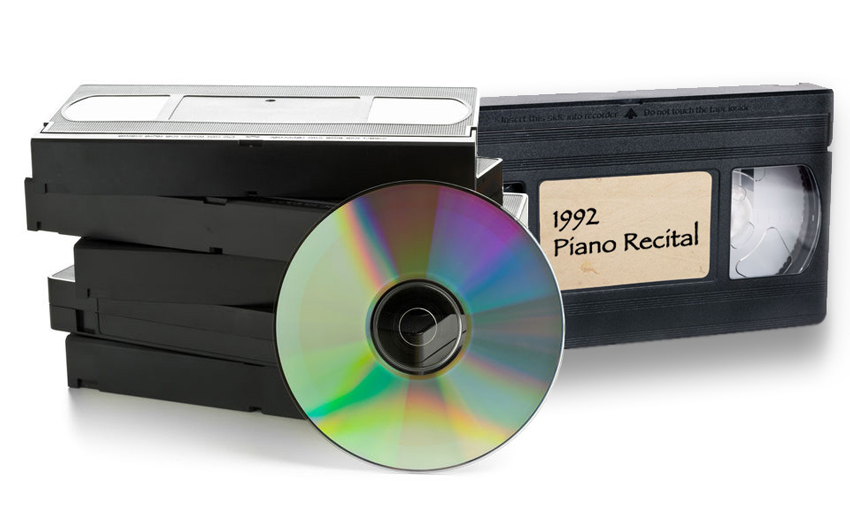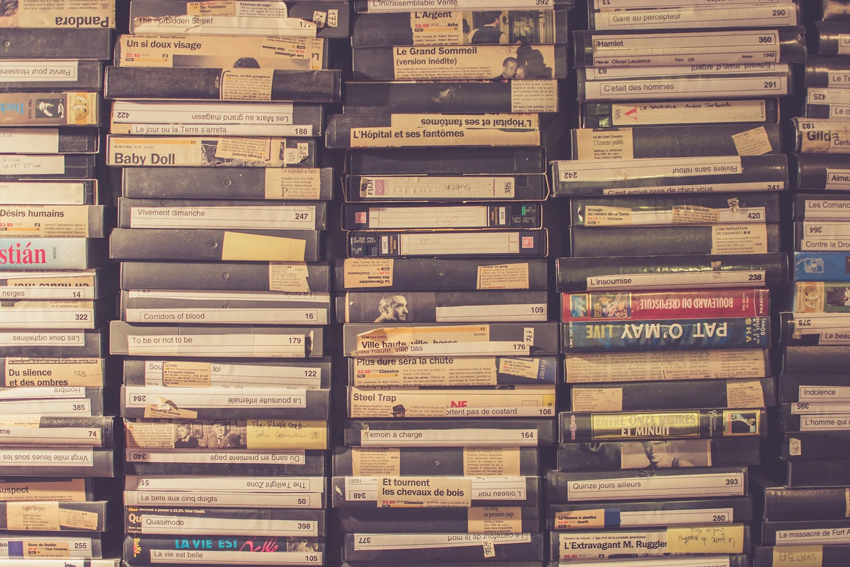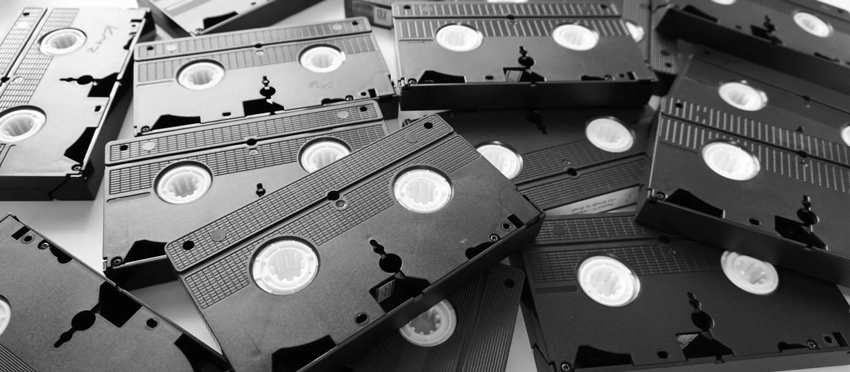VHS tapes hold a special place in many of our memories—home videos of birthdays, holidays, and everyday moments that feel almost priceless today. But if you've ever dug through a box of old tapes, you may have wondered: do VHS tapes go bad?
Understanding how long VHS tapes last is essential if you want to preserve these analog treasures. Over time, magnetic tapes degrade, and even well-kept cassettes can lose picture and sound quality. In this guide, we'll explore the typical lifespan of VHS tapes, why they deteriorate, the warning signs of decay, and the best ways to preserve—and even digitize—your tapes before it's too late.
How Long do VHS Tapes Last
The lifespan of a VHS tape can vary widely depending on its quality, storage conditions, and frequency of use. On average, most tapes remain playable for 10 to 25 years under typical home conditions. Beyond this period, the magnetic material that stores the video and audio can start to degrade, causing noticeable drops in picture and sound quality.
High-quality tapes stored in ideal conditions—cool, dry, and away from sunlight or magnetic interference—can last even longer, sometimes up to 35 to 65 years. However, these cases are rare. For the majority of home users, tapes that have been stored in basements, attics, or areas with fluctuating temperatures are at higher risk of deteriorating more quickly.
You might also be interested in what to do with old VHS tapes >>

This raises a common question among collectors and anyone rediscovering old home videos: do VHS tapes go bad? The simple answer is yes—over time, all tapes eventually degrade. Factors like repeated playback, humidity, heat, and chemical breakdown of the tape's binder contribute to this decline. Understanding these lifespan ranges helps you plan for preservation or digitization, ensuring your memories remain intact for years to come.
Why VHS Tapes Degrade
VHS tapes are made of magnetic particles coated on a plastic strip, bound together with a chemical layer that keeps the particles in place. Over time, several factors can cause these tapes to deteriorate:
1. Magnetic Signal Decay
The magnetic particles that store video and audio gradually lose their charge, leading to fading images, distorted colors, and muffled sound. This is a natural process, so even tapes stored carefully will slowly lose quality over time.
2. Binder Breakdown & Sticky-Shed Syndrome
The binder that holds the magnetic particles can absorb moisture or break down chemically, making the tape sticky. This sticky-shed syndrome can cause tapes to jam, squeal, or shed oxide, which may permanently damage both the tape and your VCR.

3. Physical Wear & Generation Loss
Every time a tape is played, rewound, or copied, it experiences physical stress. Repeated use can gradually degrade video and audio quality, and copying tapes multiple times compounds the loss.
4. Environmental Damage
Heat, humidity, sunlight, and exposure to magnetic fields accelerate tape decay. Basements, attics, or rooms with fluctuating temperatures are particularly risky. Mold growth and dust can further harm tapes if left unchecked.
Even with careful handling, it's important to remember that all VHS tapes have a limited lifespan. Recognizing the causes of deterioration is the first step toward preserving your tapes or deciding when to digitize them.
Signs That a VHS Tape is Degrading or Completely Degraded
Knowing the warning signs of VHS tape deterioration can save your memories before it's too late. Here's what to look for:
1. Visual Issues
- Snowy static, flickering lines, or tracking errors that can't be corrected.
- Washed-out colors or loss of contrast.
- Warped or wobbly images on the screen.
- Complete black screen even if audio still plays.
2. Audio Problems
- Muffled, distorted, or crackling sound.
- Audio that drops in and out intermittently.
- Sync issues between sound and video.
3. Physical Signs on the Tape
- Sticky residue or squealing noises when playing or rewinding (binder breakdown).
- Mold spots on tape reels, often white, green, or black.
- Warped, brittle, or broken tape edges.
- Vinegar-like smell indicating chemical degradation.
4. Severe Failure (Completely Degraded)
- Tape jams or breaks inside the VCR.
- Shedding of the magnetic oxide coating, leaving visible dust.
- Complete loss of video and audio signal.
Tip: If you notice these signs, stop playing the tape immediately. Further use may permanently damage it. Cleaning and digitizing the tape is the safest next step to preserve your content.
How to Preserve VHS Tapes
The lifespan of a VHS tape is limited, as the magnetic tape inside degrades over time. While deterioration is inevitable, there are several key steps you can take to slow the process and preserve your tapes for as long as possible. The best long-term solution, however, is to digitize them.
Best Practices for Storing VHS Tapes
The primary enemies of VHS tapes are environmental factors like temperature, humidity, and magnetic fields. Proper storage can significantly extend their life.
1. Control the Environment: Store tapes in a cool, dry place with stable temperatures and humidity.
- Temperature: Aim for a range between 55-70°F (13-21°C).
- Humidity: Keep the relative humidity between 30-55%.
- Avoid locations with extreme fluctuations, such as attics, basements, or garages. A climate-controlled closet or an unused room is often a good choice.
2. Protect from Light and Magnets:
- Light: Keep tapes out of direct sunlight and other sources of UV light, which can damage the plastic and tape.
- Magnets: Store tapes away from anything that can create a magnetic field, including loudspeakers, televisions, and other electronic gadgets.

3. Proper Placement:
- Store tapes vertically (like books) in their original cases. This prevents the tape from sagging on the reel over time.
- Do not stack tapes horizontally.
- Use airtight, weatherproof storage bins to protect them from dust, moisture, and pests.
4. Handle with Care:
- Rewind tapes fully before storing them. This keeps the tape tight and prevents sagging.
- Do not leave a tape inside a VCR when not in use.
- Avoid touching the tape itself. If necessary, wear thin gloves.
The Ultimate Preservation Method: Digitization
Even with perfect storage, VHS tapes will eventually deteriorate. The only way to truly preserve the content is to convert it to a digital format. You have two main options for digitizing your tapes:
1. DIY Conversion: If you have a working VCR, you can use a video capture device to connect the VCR to your computer. This allows you to record the footage as a digital file. This method can be time-consuming and the quality may vary depending on your equipment.
2. Professional Service: Many companies specialize in converting VHS tapes to digital files. They use professional-grade equipment to get the best possible quality from your tapes and can often handle issues like mold or a sticky tape. This is a good option for irreplaceable home movies or valuable recordings.
Once your tapes are digitized, you can store the files on a hard drive, a cloud service, or another modern media format for long-lasting preservation.
💡 Bonus Step: Enhance Your New Digital Files
Even after you've digitized your old video tapes, the new digital files may still suffer from the low quality inherent to the original format. This is where modern software can make a huge difference.
Aiarty Video Enhancer is designed to take your digitized footage and dramatically improve its quality. This powerful digitalized VHS video enhancer is designed to automatically and intelligently remove common issues like blur and noise, eliminate compression artifacts, and generate new details. It can also upscale your video to a higher resolution, transforming grainy, low-quality footage into a clearer, more vibrant video that truly honors those old memories. It's the perfect final step to ensure your family's treasured moments are preserved in the best quality possible.
You might also be interested in restore VHS videos to HD >>
 FAQs
FAQs
Yes, VHS tapes do go bad over time. Even well-stored tapes eventually degrade due to magnetic signal loss, binder breakdown, and environmental factors like heat, humidity, and sunlight. Limiting playback and storing tapes properly can slow the process, but all VHS tapes have a finite lifespan.
On average, VHS tapes last between 10 and 25 years under normal home conditions. High-quality tapes stored in ideal environments can last 35 to 65 years, but such conditions are rare. The actual lifespan depends on tape quality, storage, handling, and frequency of use.
Store tapes upright in a cool, dry place away from sunlight and magnetic sources. Limit playback, handle tapes gently, and consider cleaning or professional maintenance if necessary.
Absolutely. Digitization is the most effective way to preserve your memories. Converting tapes to digital formats protects the content from further physical deterioration and allows you to enjoy it without risking damage to the original tape. Make multiple backups for long-term safety.